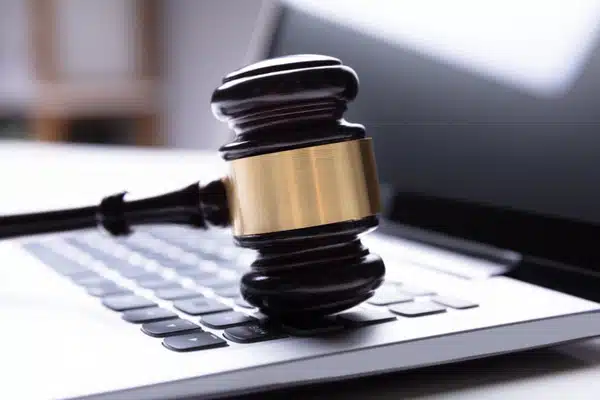
Modern trials are won with more than legal skill. They need sharp technology too. Trial technology services give legal teams the tools to present cases with power and clarity. These services handle everything from managing digital evidence to running smooth courtroom presentations during trial.
By 2025, juries expect clear visuals alongside legal arguments. Trial presentation services have become standard practice in courtrooms nationwide. They help attorneys focus on strategy while tech experts handle the complex presentation work.
Trial tech covers a wide range of support services. Litigation support firms provide these tools to help legal teams organize, manage, and present their cases effectively. Here’s what these services typically include:
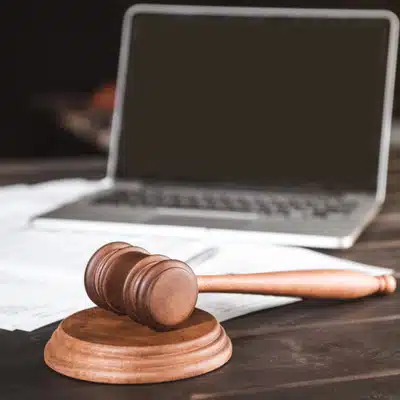
Before stepping into court, trial teams need organized case materials. Trial tech professionals create comprehensive trial presentation database systems that house all exhibits, documents, and video depositions. They scan paper files, import digital records, and build searchable databases with consistent labeling.
This document management system replaces stacks of trial binders with instant digital access. When attorneys need Exhibit 42 or a specific deposition clip, the hot seat operator can pull it up in seconds. No more fumbling through papers while the jury waits.
Modern courtroom presentations rely on sophisticated presentation software like TrialDirector, OnCue, and Sanction. These multimedia presentation tools let attorneys project exhibits onto screens for everyone to see clearly.
Professional teams prepare dynamic slides, callouts that zoom into document text, and side-by-side comparisons. They embed videos and animations directly into presentations. During trial, the tech operator displays each item exactly when needed – a contract page as the witness discusses it, a deposition video to challenge testimony, or an animation showing how an accident happened.
These visual tools boost juror comprehension significantly. Studies show juries understand and remember information better when they see it alongside hearing it.
The hot seat operator sits at the tech table and runs all audio/visual equipment during proceedings. This person acts as the courtroom’s tech director, managing every digital element so attorneys can focus on arguments.
Hot seat duties include setting up courtroom equipment rentals like projectors and monitors, testing all connections, and keeping backup devices ready. They monitor the courtroom technology throughout trial and quickly fix any technical problems.
A skilled hot seat operator keeps presentations flowing smoothly. Technical fumbles can damage a team’s credibility and interrupt persuasive momentum.
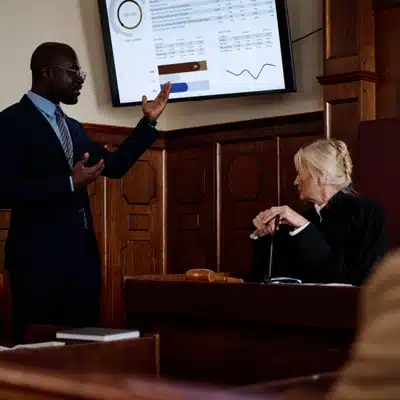
Trial graphics help explain complex information through visual aids. Expert designers create charts, timelines, diagrams, and animations that make difficult concepts clear to juries.
For medical cases, anatomical models show injury locations. Patent cases use animations to demonstrate how inventions work. Financial fraud cases rely on timeline graphics to track money movement.
By 2024, over one-third of law firms used outside experts for trial graphics – a 50% increase from the previous year. Modern juries expect polished visual elements, and professional graphics give legal teams a storytelling advantage.
Complex trials need temporary command centers called war rooms near courthouses. Litigation support teams handle all courtroom setup and war room logistics.
They arrange courtroom equipment rentals, secure conference spaces, and ensure reliable internet connections. Project management covers everything from printer setup to venue services contract negotiations for hotel blocks.
This support recreates a full office environment so trial teams can operate at peak efficiency during lengthy proceedings.
Trial tech teams provide comprehensive tech support throughout proceedings. They troubleshoot equipment failures, adapt presentations on the fly, and handle last-minute exhibit changes.
If testimony takes an unexpected turn, operators can quickly locate supporting documents in the evidence library. They annotate exhibits in real-time and edit video clips as needed.
This flexibility lets attorneys respond to trial developments without technology limiting their options.
Trial technology services have become essential for several key reasons:
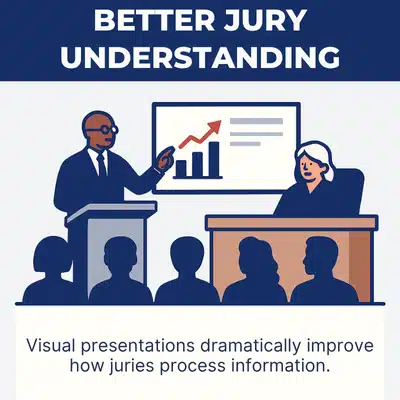
Visual presentations dramatically improve how juries process information. Courtroom presentations that combine hearing and seeing help jurors grasp complex evidence more easily.
Instead of listening to experts recite numbers from reports, juries see clear graphs and timelines. This visual approach keeps them engaged during lengthy testimony and helps them remember key facts during deliberation.
Trials are storytelling contests. Each side wants to convince the jury their version of events is true. Technology makes these stories more compelling.
Well-designed trial graphics let attorneys walk juries through evidence chronologically. Split-screen comparisons highlight document discrepancies. Interactive timelines connect scattered pieces of evidence into coherent narratives.
Polished presentations also project professionalism and preparation. They signal confidence in the case, while technical fumbles can undermine credibility.
Organized digital systems keep trials moving smoothly. Instead of searching through papers, attorneys simply request the next slide. The hot seat operator has every exhibit ready instantly.
This efficiency saves courtroom time and maintains jury attention. Digital document management reduces the risk of lost exhibits or skipped evidence. Quick database searches can locate any document by keyword or exhibit number during cross-examination.
Trials create enormous stress for legal teams. Trial technology services let attorneys focus on legal strategy while tech experts handle equipment and logistics.
Litigation support professionals manage the technical details so lawyers don’t worry about whether videos will play or projectors will work. This division of labor reduces stress and prevents costly errors.
Many firms now outsource trial presentation services rather than handling everything internally. Specialists often deliver better results faster than overworked paralegals trying to manage technology alongside their regular duties.
By 2025, most courts expect electronic evidence presentation. Many courtrooms include integrated screens and audio systems. Attorneys who rely only on paper may find themselves at a disadvantage.
Modern juries also expect high-quality visuals in their daily lives. They respond better to professional presentations than outdated methods. Using current technology shows legal teams are serious about their cases.
Several important trends are shaping trial tech in 2025:
More law firms are hiring external litigation support specialists instead of handling presentations internally. Industry surveys show only 27.9% of firms managed trial tech in-house in 2024, down from 32.7% the previous year.
This shift recognizes that specialists deliver better results than stretched internal staff. Litigation support firms have responded by expanding their trial services offerings nationwide.
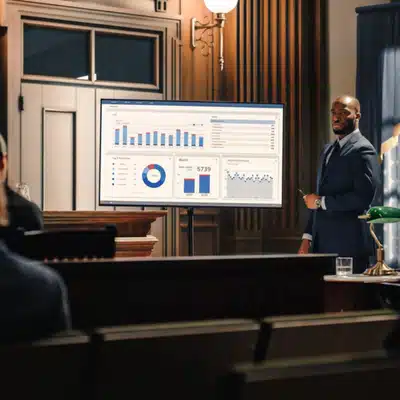
Presentation software has become more sophisticated and accessible. While 75% of attorneys still use PowerPoint for basic presentations, growing numbers rely on specialized tools like TrialDirector (35% adoption) and TrialPad (20% adoption).
These dedicated platforms offer features like integrated trial presentation database creation, quick exhibit searches, and transcript synchronization with video.
The pandemic pushed courts toward remote hearings and virtual trials. While most jury trials have returned to in-person formats, hybrid proceedings remain common for pre-trial matters.
Trial technology services now support these mixed environments. They ensure remote witness feeds integrate with courtroom displays and that exhibits display properly for both in-person and virtual participants.
Trial graphics have become more interactive and sophisticated. 3D models, animated timelines, and real-time data visualization help present complex information clearly.
High-resolution displays and individual juror screens in modern courtrooms let everyone see details clearly. The expectation for professional-quality visuals continues rising.
Digital evidence requires careful security measures. Top litigation support providers use encrypted storage, secure networks, and strict access controls for sensitive trial data.
They also help navigate evolving court rules on electronic evidence submission and ensure proper chain of custody for digital exhibits.
When selecting trial presentation services, consider these key factors:
Look for providers with extensive real trial experience. They should understand different courtroom procedures, judge preferences, and how to integrate smoothly with trial teams.
The hot seat operator role demands performance under pressure. Choose someone who stays calm and adapts quickly when testimony takes unexpected turns.
Match provider capabilities to your case needs. Some trials require full trial consulting including jury research and witness preparation. Others need only presentation support.
Consider whether you need war room setup, equipment coordination, and venue services for out-of-town trials. Comprehensive support can be invaluable for complex cases.
Trials move fast and change quickly. Choose providers who respond rapidly to last-minute requests and stay available 24/7 during proceedings.
Ask about backup plans for equipment failures and how they prevent problems before they happen. The best litigation support teams pride themselves on solving problems quickly.
References from other attorneys provide valuable insight into provider performance. Courtroom experience is hard to simulate, so testimonials from similar cases offer important perspective.
Look for litigation support firms willing to discuss their notable cases and client successes. They should feel like true partners in your trial strategy, not just technical support.
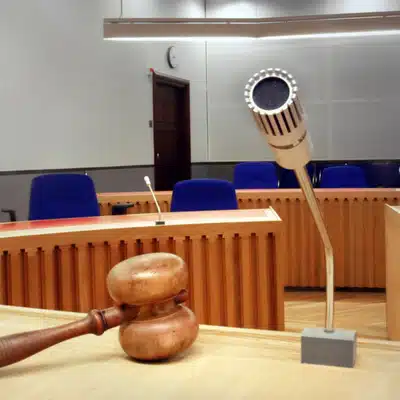
Trial technology services and courtroom support services will continue evolving as courtrooms modernize further. Artificial intelligence may soon help with database creation of trial presentations, analyzing large document sets, producing document enlargements, and suggestion of key exhibits. Virtual reality in trial mode could let juries, with live jury monitoring, experience crime scene reconstructions firsthand in trial environments.
However, the core mission remains constant: helping legal teams, through sharp trial presentation skills, present their cases clearly and persuasively. As information becomes more complex and juries expect higher production values, the litigation support industry makes these services even more essential.
Litigation tech and related litigation technology services are no longer optional for serious trial work. It’s become a standard part of case preparation, alongside organizing trial documents and voir dire consulting, just like legal research and witness interviews.
Modern trials demand modern tools. Trial technology services give you the competitive edge needed to present cases effectively in today’s courtrooms.
Don’t let outdated presentation methods undermine strong legal arguments. Partner with experienced litigation support professionals who understand both technology and trial strategy.
Contact a qualified trial services provider today to discuss how they can strengthen your next case presentation. Your clients deserve every advantage technology can provide in pursuit of justice.
The difference between winning and losing often comes down to how clearly you present your story. Make sure yours is heard, seen, and remembered.
They cover digital evidence management, presentation software, hot seat operation, graphics and demonstratives, war room setup, and on-call technical support. These services organize exhibits, run multimedia in court, and keep proceedings smooth and secure.
The operator runs all courtroom A/V, calls up exhibits and deposition clips on cue, and fixes tech issues in real time. Their calm, precise execution lets attorneys focus on advocacy instead of equipment.
Clear visuals improve juror comprehension and recall, turning complex timelines, medical details, or financial flows into simple stories. Polished graphics also signal preparation and credibility, strengthening persuasion while reducing confusion.
Prioritize real courtroom experience, rapid response, and full-service capabilities like war room logistics, equipment coordination, and secure evidence handling. Ask for references and backup plans so you know they can adapt under pressure and keep presentations on track.
